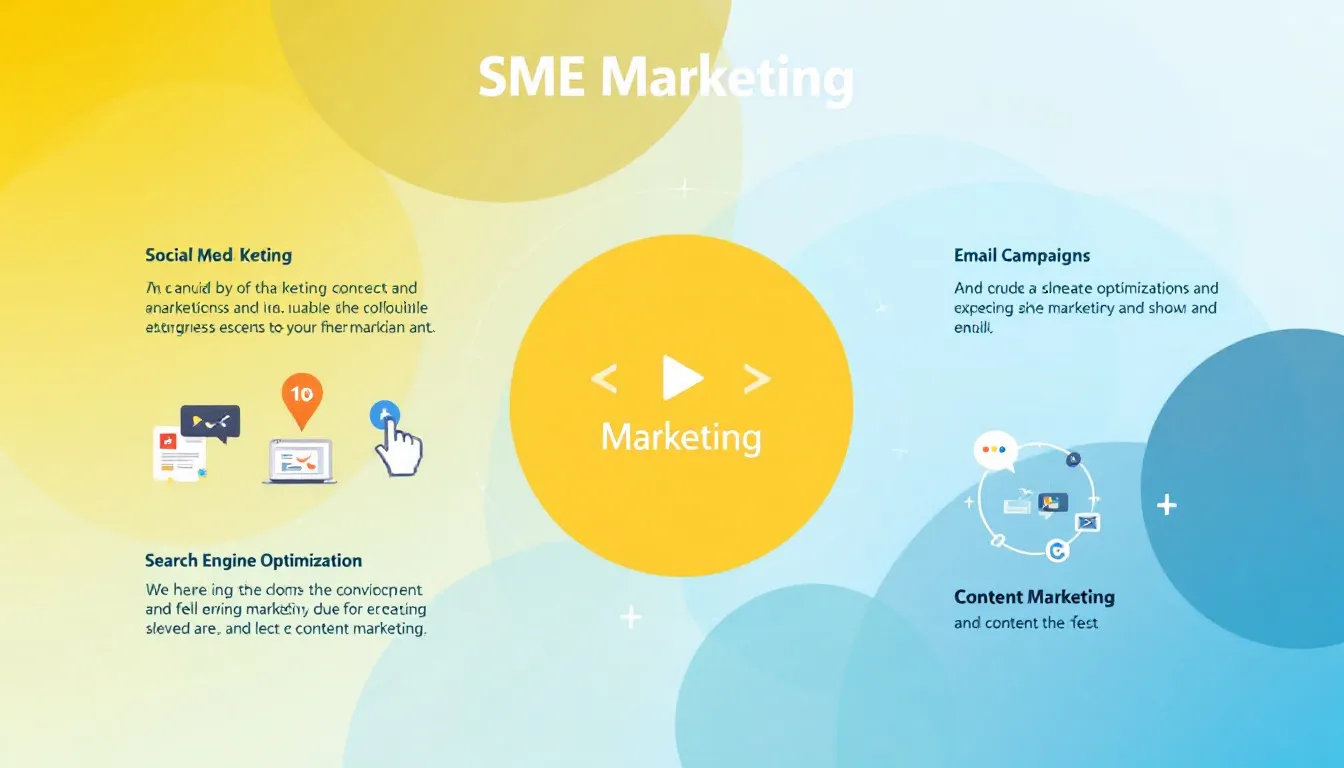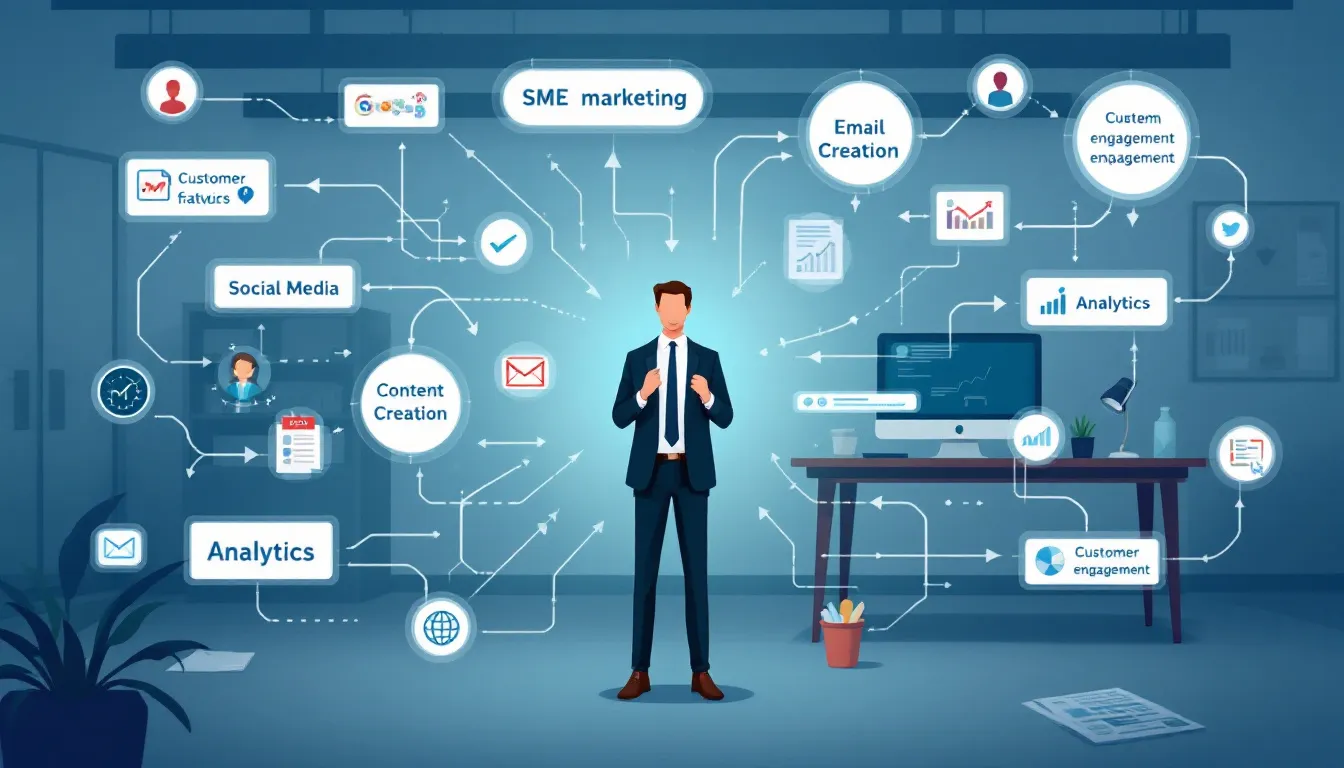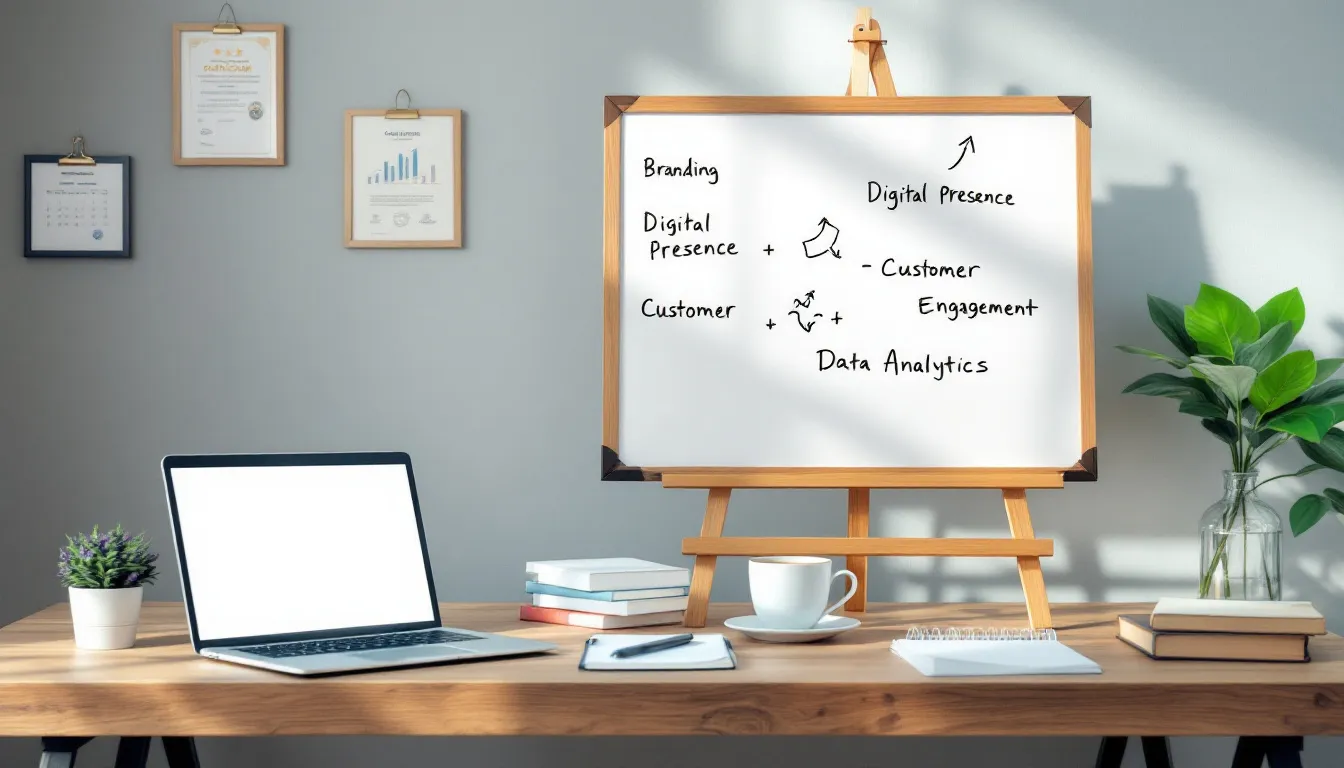Small and medium enterprises (SMEs) face unique marketing challenges that demand specialised strategies and creative approaches. Unlike large corporations equipped with substantial marketing budgets and dedicated teams, SMEs must be strategic, efficient, and innovative with their marketing efforts to thrive. Understanding effective marketing for SMEs is crucial for driving business growth, acquiring new customers, and achieving long-term success in competitive markets.
A key first step in any marketing plan is identifying the target audience. This ensures that marketing activities focus on reaching the right potential customers and that resources are allocated efficiently. Creating detailed buyer personas based on demographic and psychographic data helps small business owners visualise their ideal customers, enabling the development of tailored and impactful marketing strategies.

What is SME Marketing?
SME marketing refers to the specialized strategies, tactics, and approaches designed specifically for small and medium enterprises. This form of marketing acknowledges the distinct constraints and opportunities SMEs face, such as limited budgets, smaller teams, a local market focus, and the need for immediate, measurable results.
For example, local search engine optimisation (SEO) is vital for SMEs with physical locations, helping them attract nearby customers and improve visibility within their communities. Consistency in website design, brand messaging, and business name builds trust and brand recognition, which is essential for establishing credibility. Participating in local events is a low-cost strategy for small businesses to create visibility and build relationships. Leveraging customer testimonials as social proof further enhances trust in marketing campaigns.
Marketing for SMEs differs substantially from marketing for large corporations in several ways:
-
Budget Constraints: SMEs often operate with much smaller marketing budgets, necessitating a focus on cost-effective marketing and maximizing return on investment. Setting SMART marketing goals (Specific, Measurable, Achievable, Relevant, Time-bound) helps ensure that every marketing pound spent delivers value.
-
Resource Limitations: Many small business owners manage marketing themselves or have limited staff, requiring efficient and manageable marketing activities.
-
Local Market Focus: SMEs frequently serve local or regional markets, which requires different approaches than broad national or global campaigns.
-
Agility Advantage: SMEs can quickly pivot and adapt their marketing strategies in response to changing market conditions, an advantage over larger, slower-moving corporations.
-
Personal Relationships: SME marketing often relies on building personal connections, word-of-mouth referrals, and strong community ties.

Understanding the SME Marketing Landscape
Unique Challenges Facing SMEs
SMEs encounter several hurdles in their marketing efforts, including:
-
Limited Marketing Budgets: Typically, SMEs allocate between 2-5% of revenue to marketing, which is considerably less than larger enterprises that may spend 10-15% or more.
-
Lack of Specialized Marketing Expertise: Small business owners often juggle multiple roles and may lack formal training in marketing.
-
Competition with Larger Businesses: SMEs must compete against companies with extensive marketing resources and established brands.
-
Time Constraints: Managing day-to-day operations leaves limited time for marketing activities.
-
Measuring ROI: Without access to sophisticated analytics tools or expertise, many SMEs struggle to accurately assess the effectiveness of their marketing campaigns.
Advantages SMEs Have in Marketing
Despite these challenges, SMEs possess unique strengths:
-
Flexibility and Speed: The ability to quickly adjust marketing strategies in response to customer feedback or market trends provides a competitive edge.
-
Customer-Centric Approach: SMEs can tailor marketing efforts to meet specific customer needs and preferences, enhancing engagement on a personal level.
-
Personal Touch: Smaller businesses often deliver more personalized customer experiences, fostering strong relationships and a loyal customer base.
-
Niche Specialization: SMEs can focus on niche markets that larger competitors may overlook.
-
Local Community Connections: Deep ties to local communities provide opportunities for authentic engagement and loyalty.
-
Authentic Storytelling: Owners often have compelling personal stories that resonate with customers and build brand affinity.

Essential Marketing Strategies for SMEs
Digital Marketing Fundamentals
In today’s digital world, a strong online presence is vital for SMEs. Key components include:
-
Leveraging third-party platforms and online marketplaces to reach a wider audience and enhance visibility. These platforms provide SMEs with opportunities to showcase their products or services to a broader customer base, often with minimal upfront costs.
Website Optimization
A professional, user friendly website optimized for mobile devices is the cornerstone of digital marketing for small businesses. It should be mobile-responsive, fast-loading, and easy to navigate. Clear value propositions and detailed service descriptions help potential customers understand what the business offers. Including customer testimonials and case studies adds credibility. Local SEO optimization ensures the website appears in location-based searches. Additionally, creating and maintaining a Google Business profile enhances local visibility and attracts nearby customers.
Search Engine Optimization (SEO)
Organic search visibility is one of the most cost effective ways for SMEs to generate long-term traffic. Effective SEO strategies include optimizing for local keywords, managing Google My Business listings, creating relevant content that addresses customer questions, building local citations, and encouraging positive customer reviews. This search engine optimisation approach helps small businesses rank higher in search results and drive more qualified leads.
Social Media Marketing
Social media channels offer SMEs an affordable way to connect directly with their target audience. Selecting platforms where the audience is most active allows for more effective engagement. Consistent posting of valuable and relevant content, active community interaction, and using local hashtags or geo-tagging can boost visibility. Social platforms like Facebook, Instagram, LinkedIn, TikTok, and others allow you to connect directly with potential customers, build relationships, and increase awareness of your brand. Running giveaways or contests on social media can increase engagement and attract new followers. Encouraging user-generated content increases authenticity and trust. Social media advertising offers SMEs a cost-effective way to reach a wide audience, enabling them to target specific demographics and achieve measurable results. Social media advertising, including social media ads and paid ads, can further amplify reach and help achieve specific marketing goals.
Email Marketing
Email remains one of the highest ROI channels for SMEs. Building an email list through lead magnets—like discounts or exclusive content—allows businesses to communicate directly with interested customers. Gathering email addresses can also be achieved through various incentives, such as offering free resources, exclusive access, or entry into a giveaway. Building an email list is essential for small businesses to keep customers informed about promotions and events. Crafting a compelling subject line is critical to improving open rates. Regular email campaigns featuring helpful content, promotions, and personalized messages nurture relationships and encourage repeat business. Segmenting email lists based on customer preferences enhances relevance and engagement. Monitoring metrics like open rates and click through rate helps refine campaigns for better results.
Traditional Marketing Approaches

While digital marketing is essential, traditional methods remain powerful for SMEs:
Networking and Relationship Building
Personal connections are key. Joining local business groups, chambers of commerce, and industry associations helps build valuable relationships. Collaborations with complementary other businesses and participation in community events or sponsorships foster trust and visibility. Hosting workshops or product launches can engage local audiences effectively.
Direct Mail and Local Advertising
Targeted marketing through postcards, flyers, local advertising, local newspapers, radio ads, and vehicle signage reaches specific geographic areas. Participating in trade shows and markets further enhances brand exposure and customer engagement.
Content Marketing
Creating and sharing valuable content, such as blog posts, how-to guides, video tutorials, and case studies, establishes authority and builds trust. This content can be distributed across digital channels and supports SEO efforts.
Budget-Effective Marketing Tactics for SMEs

Low-Cost, High-Impact Strategies
Customer Referral Programs
Leveraging satisfied customers to generate new leads is a highly effective and affordable tactic. Offering incentives to both referrers and new customers helps reward customers and encourages word-of-mouth marketing. Simple referral tracking and regular communication about referral opportunities maintain momentum.
Local SEO and Google My Business
A fully optimized Google My Business profile with accurate contact information, professional photos, and regular updates increases local search visibility. Actively managing and responding to customer reviews enhances reputation and trust.
Social Media Engagement
Authentic interactions on social media—such as responding to comments, sharing behind-the-scenes content, and participating in local online groups—build genuine connections. Regularly posting valuable, non-promotional content keeps followers engaged.
Content Creation and Sharing
Educational blog posts, instructional videos, infographics, and customer success stories help SMEs demonstrate expertise and build credibility without significant expense.
Leveraging Technology for SME Marketing
Customer Relationship Management (CRM) Systems
Affordable CRM tools help SMEs organize contacts, track communication history, manage sales pipelines, and segment customers for targeted marketing.
Marketing Automation Tools
Automating repetitive tasks like email sequences, social media scheduling, and lead qualification saves time and ensures consistent outreach.
Analytics and Measurement Tools
Using free or low-cost tools like Google Analytics and social media insights allows SMEs to track website traffic, engagement, and email campaign performance. Regular analysis helps optimize marketing activities and improve ROI.
Sector-Specific SME Marketing Approaches

Retail SMEs
Retail businesses benefit from visual merchandising that creates attractive in-store displays. Seasonal promotions aligned with holidays boost sales, while loyalty programs encourage repeat purchases. Active involvement in local community events strengthens brand presence.
Service-Based SMEs
Showcasing work through case studies and portfolios builds credibility. Offering educational content via workshops or webinars positions the business as an expert. Networking with industry peers and managing online reviews enhances reputation.
B2B SMEs
LinkedIn marketing is crucial for professional networking and sharing expertise. Advertising in trade publications and attending conferences generates leads. Partnering with complementary businesses expands reach.
E-commerce SMEs
Paid search engine marketing and shopping campaigns drive traffic. High-quality product photography and customer reviews provide social proof. Email sequences targeting abandoned carts help recover lost sales.
Measuring Marketing Success for SMEs
Key Performance Indicators (KPIs)
Tracking metrics aligned with marketing goals is essential. Important KPIs include:
-
Lead Generation Metrics: Number of qualified leads, cost per lead, lead-to-customer conversion rates.
-
Customer Acquisition Metrics: Customer acquisition cost (CAC), customer lifetime value (CLV), return on marketing investment (ROMI).
-
Brand Awareness Indicators: Website traffic growth, social media engagement, local search rankings.
-
Sales Performance Metrics: Revenue attributed to marketing, sales cycle length, average order value, customer retention rates.
Simple Tracking and Analysis
Regular marketing reviews—monthly or quarterly—help assess performance, analyze successful campaigns, and plan future activities. Integrating customer feedback through surveys and reviews provides valuable insights to refine marketing messages and improve the customer experience.
Building a Marketing Team for SMEs

When to Hire Marketing Help
Deciding between internal hires and outsourcing depends on business needs and budget. Part-time assistants or freelancers can manage specific tasks, while agencies offer comprehensive services. Essential roles include marketing coordinators, content creators, digital marketing specialists, and graphic designers.
Training and Development
Upskilling existing staff through online courses and workshops builds in-house marketing capabilities. Encouraging a marketing culture across the company ensures all employees contribute to marketing efforts, from customer service to sales.
Common SME Marketing Mistakes to Avoid
Strategic Errors
Avoid trying to do everything at once or spreading resources too thin. Maintain consistent messaging and focus on the ideal target audience. Avoid expecting immediate results from long-term marketing strategies.
Tactical Mistakes
Neglecting website optimization, inconsistent social media posting, ignoring mobile devices, and focusing solely on new customer acquisition can harm results.
Measurement and Analysis Errors
Ensure proper tracking systems are in place, avoid focusing only on vanity metrics, calculate ROI accurately, and balance analysis with timely action.
Future Trends in SME Marketing

Emerging Technologies and Opportunities
Artificial intelligence tools are increasingly accessible, offering chatbots, automated content creation, predictive analytics, and personalized marketing. Voice search optimization and video marketing—especially short-form and live content—are growing in importance. Mobile apps enhance customer engagement and convenience. Sustainability and ethical practices are increasingly important to consumers and can influence their purchasing decisions.
Evolving Customer Expectations
Customers now demand personalized experiences, sustainability, seamless omnichannel interactions, and instant responses. SMEs that adapt to these expectations gain a competitive advantage.
Creating Your SME Marketing Plan

Strategic Planning Process
Effective marketing plans start with thorough market research and competitor analysis. Defining detailed customer personas and conducting SWOT analysis help clarify opportunities and challenges.
Implementation Framework
Breaking down the plan into quarterly cycles, monthly calendars, weekly reviews, and daily activities ensures consistent execution and flexibility.
Budget Allocation Guidelines
A balanced budget might allocate 40-60% to digital marketing, 20-30% to traditional marketing, 15-25% to content creation, 10-15% to marketing tools, and 5-10% to training.
Conclusion: Maximizing SME Marketing Success
Effective marketing for SMEs requires a strategic, measured approach that balances limited resources with ambitious growth goals. Building brand awareness is essential for businesses of any size. Success depends on understanding your unique market position, focusing on high-impact marketing activities, and continuously measuring and optimizing your efforts.
Focusing on digital channels like social media advertising, email marketing, and local SEO, including optimizing your Google Business Profile, maximizes budget efficiency. Leveraging free tools, creating valuable content, and engaging customers directly through personalized communications fosters lasting relationships and increases sales.
Remember, effective SME marketing is a marathon, not a sprint. Building brand awareness, customer loyalty, and market presence takes time, but consistent, strategic efforts yield significant growth and long-term success. Whether starting or refining your marketing journey, prioritize understanding your customers, delivering value, and building authentic connections to drive real business results.
Frequently Asked Questions (FAQ) About Marketing for SMEs
What is the most effective marketing strategy for SMEs?
The most effective marketing strategy for SMEs combines digital fundamentals like search engine optimisation, social media marketing, and email marketing with traditional methods such as networking and local advertising. Tailoring your marketing plan to your target audience, setting clear marketing goals, and consistently measuring performance are essential for success.
How can SMEs maximize their limited marketing budget?
SMEs can maximize their budgets by focusing on cost effective digital channels like social media ads, email marketing, and local SEO, including optimizing their Google Business Profile. Leveraging free tools, creating valuable content, and engaging customers directly through personalized communications help increase returns without large expenditures.
Why is a user friendly website important for SMEs?
A user friendly website acts as the digital storefront for SMEs, providing easy access to product and service information, supporting search engine optimisation, and enhancing the customer experience. Mobile compatibility and fast loading speeds increase engagement and conversion rates.
How can SMEs build lasting relationships with their customers?
Building lasting relationships involves offering excellent customer service, rewarding loyal customers through referral and loyalty programs, and maintaining ongoing communication via email campaigns and social media channels. Personalized interactions and valuable content foster a loyal customer base and encourage repeat business.
What role do social media channels play in SME marketing?
Social media channels enable SMEs to engage directly with customers, share relevant content, and build brand awareness. Using targeted social media advertising and maintaining consistent posting schedules helps reach the ideal audience, gain insights into customer preferences, and drive significant growth. Social media marketing takes time, but it's a great way to connect with customers and grow online presence. Platforms like Instagram and Facebook offer features like Stories and live videos, which can showcase new products or share business updates.
How can SMEs measure the success of their marketing efforts?
Success can be measured by tracking KPIs such as website traffic, click through rate, leads generated, conversion rates, and social media engagement. Regularly reviewing these metrics alongside customer feedback provides valuable insights to refine strategies and improve ROI.
What are some emerging trends SMEs should consider in their marketing?
Emerging trends include the adoption of artificial intelligence tools for customer service and content creation, voice search optimisation, video marketing with instructional videos, and mobile apps to enhance engagement. Embracing these trends offers a competitive advantage and opens new markets.
How important is local SEO and Google Business Profile for SMEs?
Local SEO and a well-maintained Google Business Profile are critical for SMEs targeting local customers. They improve visibility in local search results and on maps, making it easier for customers to find and contact the business. Regular updates and encouraging customer reviews boost local credibility.
Can SMEs benefit from paid ads with a small budget?
Yes, paid ads on platforms like Google and social media can be highly effective even on a small budget. By targeting specific demographics and geographic areas, SMEs can maximize advertising efforts, increase brand visibility, and drive traffic that leads to sales.
How do SMEs create a successful marketing plan?
A successful marketing plan involves understanding the target audience, setting specific and measurable marketing goals, selecting appropriate channels, allocating a realistic budget, and scheduling marketing activities. Regular monitoring and adjustment based on performance data ensure ongoing effectiveness.
By following these guidelines and leveraging the strategies outlined, small firms and medium sized enterprises can harness the power of marketing to achieve significant growth, attract new customers, and build a thriving business in today’s competitive landscape.


0 comments